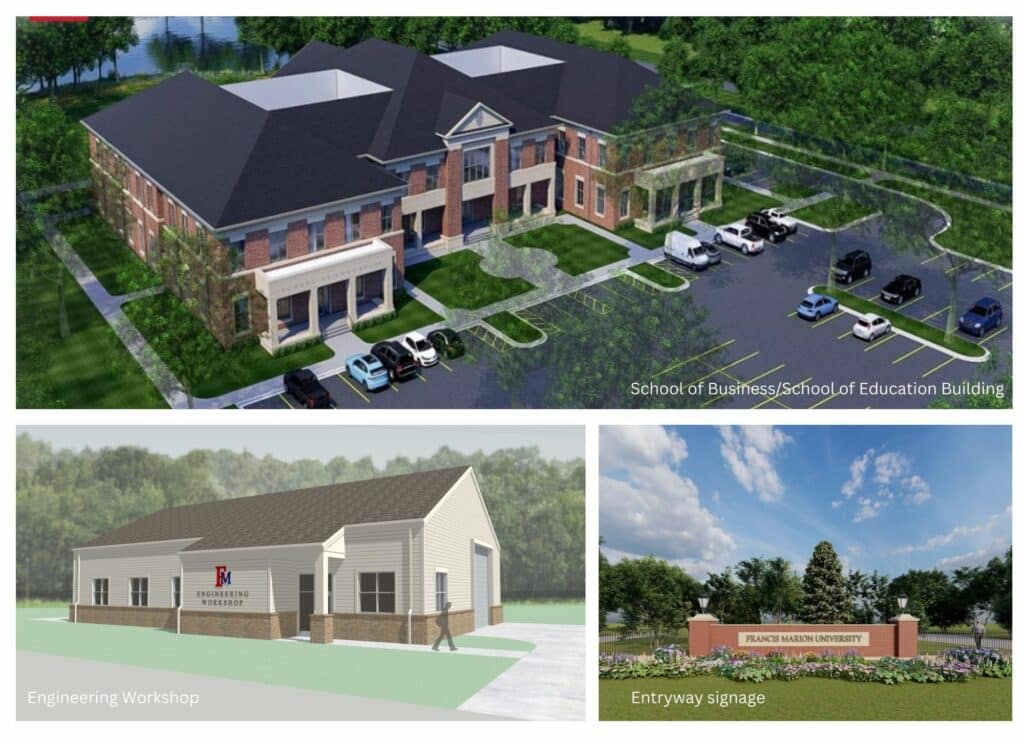June 20, 2024
FMU Board of Trustees releases updated campus plans, new programs

The Francis Marion University Board of Trustees held its quarterly meeting on the university’s campus Thursday afternoon. During the meeting, updates to campus facilities and new programs were presented along with plans for upcoming facility renovations.
For the past two years, the university has been engaged in numerous building and renovation projects to meet the needs of new and growing programs. The first of these major projects, the renovation of the Smith University Center, one of the university’s original buildings built in 1973, was completed in December 2023.
The School of Business/School of Education building, a $23 million project funded entirely by the state, is slated to open for classes in August. This 54,000 square foot building will house the Schools of Business and Education.
A new 4,400 square foot Engineering Workshop is also under construction. It will provide industrial-type space for heavy equipment and design projects necessary for the industrial engineering and mechanical engineering programs. This $1.37 million project is expected to be completed in July.
The campus is undergoing changes to its entryways as well. New university signage is being constructed at each entryway into campus and in front of the Stokes Administrative Building, which houses the university’s administrative offices.
In addition, renovations are also taking place in Phase II of the Village Apartments refurbishment over the summer. Campus roads, parking lots, and sidewalks are being resurfaced as well and will be completed before the fall semester begins.
Renovations are also occurring in the Leatherman Medical Education Complex in downtown Florence to accommodate the Doctorate of Occupational Therapy program that begins in August. These renovations will provide both living and vocational simulation areas for students in the university’s newest doctoral program.
President Fred Carter shared with the Board that current building and renovation projects will be complete when students return to campus for the fall semester. He also provided a glimpse into future projects.
“FMU has one of the most beautiful college campuses in South Carolina. The construction of these new buildings and the renovation of existing ones will ensure that the campus remains as instructionally functional as it is attractive. Over the past two decades, we’ve added a rich array of new degree programs, and a few more are in the planning stage. Many of these require specialized and distinctive facilities. Fortunately, the university has the resources to build these without increasing student tuition or incurring any institutional debt.”
Carter credited the legislative delegation and philanthropic donors with providing appropriations and contributions to address these building needs. He also thanked Governor McMaster for the substantial programmatic support that he has provided the university.
In addition to the current projects, work will begin soon on the Floyd Medical Consortium Building (former Circle Park Building in downtown Florence) as well as the Forestry and Environmental Sciences Building on campus.
The Floyd Medical Education Consortium Building will be the sixth FMU facility located in downtown Florence. Design work for renovations to this building is underway. 3rd and 4th year medical students from MUSC and USC-School of Medicine, medical residencies in collaboration with both medical schools and regional hospitals, and other graduate health science programs in development will be housed in this building which is expected to be completed in 2026.
The Forestry and Environmental Sciences Building is an $18 million project that will support new programs in forestry and environmental sciences. Located on FMU’s main campus, this building will include instructional space, laboratories, and collaborative work facilities. It is expected to be completed in Fall 2025.
In addition to work on numerous campus facilities, there are also a number of new academic programs slated to begin during the upcoming academic year.
In the fall, the university will welcome the first class of students in its new Occupational Therapy Doctorate (OTD) program. Students in the OTD program will take most of their courses in the Carter Center for Health Sciences and the Leatherman Medical Complex, both in downtown Florence. In addition to classroom work, students will also benefit from the lab spaces designed to simulate both living and vocational rehab facilities, and be well-prepared to enter the workforce upon their completion of the program.
The university will also begin a new bachelor’s degree program in Criminal Justice pending state approval later this summer. This program will blend theoretical knowledge with practical application, and has a curriculum covering a wide range of topics including the politics of crime, the relationship of criminal justice to public policy, and legal studies. This interdisciplinary program – coursework will be completed in both political science and sociology – will equip students with the skills and knowledge for advanced roles in the field of criminal justice.
The final new program beginning during the 2024-2025 academic year is the Bachelor of Science in Education, Multi-categorical Special Education: Autism Studies, Pre-K through 12. The first of its kind in South Carolina and only one of two programs in the southeastern United States, it will focus on the needs of autistic individuals and students with other neurodevelopmental disorders. Education, Psychology, Speech-Language Pathology, and Occupational Therapy have collaborated in the creation of this degree, which will provide a strong scholarly and practical base in special needs education and address the specific educational, therapeutic, and interventional needs of autistic and neurodevelopmentally divergent students in pre-kindergarten through twelfth grade.
“This university is doing everything possible to address the workforce needs of the region while providing students a broad and comprehensive education. No one does this better than our faculty,” Carter concluded.